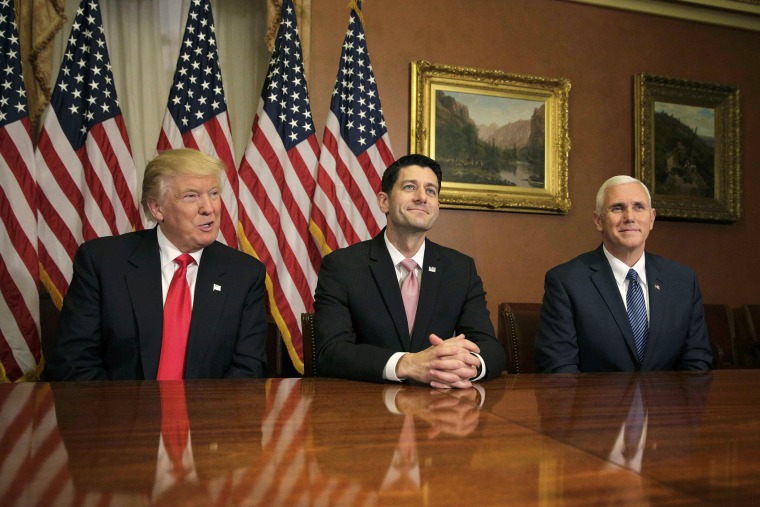House Speaker Paul Ryan (R-Wis.) is obviously aware of the alleged Russian hacking scandal, but responding to it is tricky for someone in his position.The Wisconsin congressman has traditionally defended the U.S. intelligence community, but he's serving with an incoming president who routinely mocks and taunts American intelligence agencies. Ryan has criticized WikiLeaks founder Julian Assange, but the Speaker also wants to remain on good terms with Donald Trump, who considers Assange credible and trustworthy.So, what's a House Speaker to say about allegations that Russia subverted our democracy because Vladimir Putin wanted to see Trump in the White House? The Associated Press reported yesterday on Ryan's latest line.
[E]ven while criticizing Assange, Ryan defended Trump, saying that what the president-elect is "rightfully concerned about is partisans are trying to use the Russian hacking incident to ... call into question the legitimacy of his victory."
This comes up quite a bit. The RNC's Sean Spicer, the incoming White House press secretary, told reporters two weeks ago, "I think you have a lot of folks on the left who continue to undermine the legitimacy of [Trump's] win." Two weeks earlier, Jason Miller, a Trump transition spokesperson, added that bipartisan calls for an investigation are "an attempt to delegitimize President-elect Trump's win."This is a problematic argument, which may ultimately become self-defeating.This came up a bit a few weeks ago, when Donald Trump started lying about the popular-vote totals, claiming he'd secretly won the popular vote if you exclude ballots cast illegally. Trump's own lawyers said the argument wasn't true, but observers at least understood the president-elect's motivation: he was trying to defend the legitimacy of his win.The same is true with Russia's suspected intervention on Trump's behalf: to hear leading Republicans tell it, questions about the scandal are intended to undermine public confidence in the president-elect's victory. Democrats, the argument goes, want a cloud to hang over the incoming presidency.But I think GOP partisans may inadvertently be giving away the game.At this point, 17 U.S. intelligence agencies believe Russia was responsible for stealing Democratic documents in order to influence the outcome of the American presidential election. Trump has made it abundantly clear that he rejects the intelligence, and his partisan allies are arguing that the questions themselves are inappropriate, because they make the president-elect's victory appear less legitimate.But what if the intelligence is correct? What if U.S. intelligence agencies have found incontrovertible proof that Putin's government was responsible for the attack on our democracy? For weeks, Trump and his allies have said the allegations raise questions about the legitimacy of his upcoming presidency, but following that line of reasoning, if the allegations are true, are we to believe Americans should question Trump's legitimacy?I can appreciate why Team Trump is reluctant to accept the evidence after denying it for months, but the president-elect and his allies have also painted themselves into a corner: if the legitimacy of Trump's victory is based in part on the untrustworthiness of the Russia story, the president-elect may have a serious problem on his hands.The fact that Americans were given a choice, and Trump came in second by nearly 3 million votes, already raises difficult questions for the president-elect about the consent of the governed. But Trump and other Republican have also suggested that the legitimacy of his presidency is in doubt if the Russia story is true.That's not a good position for the incoming White House team to put itself in.
